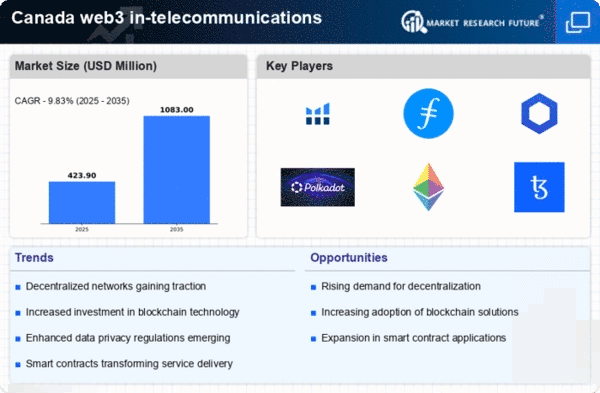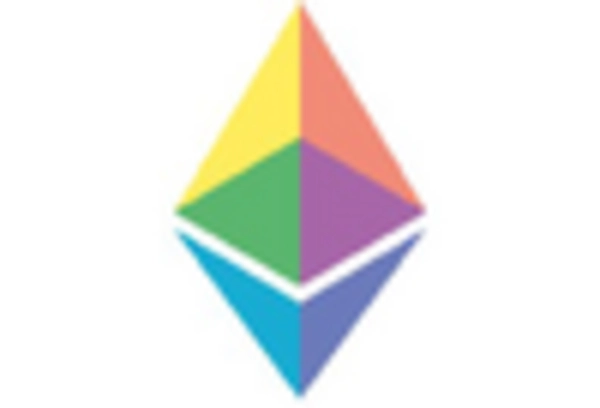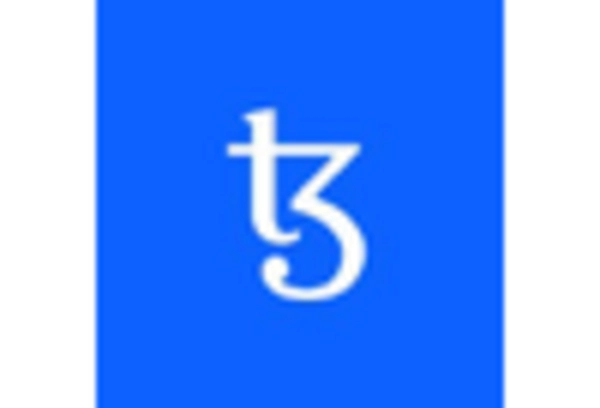Expansion of 5G Infrastructure
The expansion of 5G infrastructure is a pivotal factor influencing the web3 in-telecommunications market. In Canada, the rollout of 5G networks is expected to reach 90% coverage by 2026, facilitating faster and more reliable connectivity. This advancement is likely to enable a plethora of new applications, including IoT and smart city initiatives, which depend on robust telecommunications networks. The Canadian government has invested heavily in 5G development, with funding exceeding $1 billion to support infrastructure projects. As 5G technology becomes more prevalent, it may drive innovation in the telecommunications sector, encouraging the development of new services and enhancing user experiences.
Growth of Edge Computing Solutions
The proliferation of edge computing is significantly influencing the web3 in-telecommunications market. By processing data closer to the source, edge computing reduces latency and enhances the performance of telecommunications services. In Canada, the edge computing market is projected to grow at a CAGR of 25% over the next five years. This growth is driven by the increasing demand for real-time data processing in various sectors, including telecommunications. As companies adopt edge computing solutions, they are likely to improve service delivery and customer satisfaction. This trend may also lead to the development of new applications and services that leverage the capabilities of edge computing, further transforming the telecommunications landscape.
Emergence of Decentralized Identity Solutions
The rise of decentralized identity solutions is reshaping the web3 in-telecommunications market. These solutions empower users to control their personal data, enhancing privacy and security. In Canada, the demand for such systems is increasing, with a reported 60% of consumers expressing concerns over data privacy. This shift towards user-centric identity management is likely to drive innovation in telecommunications, as companies seek to integrate these solutions into their services. Furthermore, the Canadian government is exploring frameworks to support decentralized identity, which could further accelerate adoption. As organizations in the telecommunications sector adapt to these changes, they may find new opportunities for growth and differentiation in a competitive landscape.
Increased Demand for Enhanced Security Protocols
As cyber threats continue to evolve, the web3 in-telecommunications market is witnessing a heightened demand for enhanced security protocols. In Canada, the telecommunications sector has reported a 30% increase in security-related incidents over the past year. This alarming trend is prompting companies to invest in blockchain technology and other decentralized solutions to safeguard user data and communications. The integration of advanced security measures not only protects consumers but also builds trust in telecommunications services. Consequently, firms that prioritize security in their offerings may gain a competitive edge, appealing to a market increasingly concerned with data integrity and protection.
Adoption of Blockchain for Supply Chain Transparency
The adoption of blockchain technology for supply chain transparency is emerging as a key driver in the web3 in-telecommunications market. In Canada, telecommunications companies are increasingly recognizing the potential of blockchain to enhance operational efficiency and accountability. A recent survey indicated that 45% of telecommunications firms are exploring blockchain applications to track and verify the integrity of their supply chains. This shift not only improves transparency but also reduces the risk of fraud and errors. As the industry embraces blockchain solutions, it is likely to foster greater collaboration among stakeholders, ultimately leading to a more resilient and efficient telecommunications ecosystem.
















